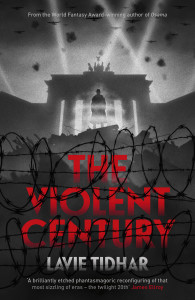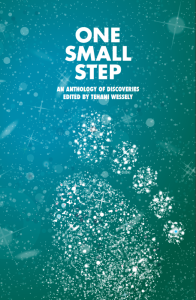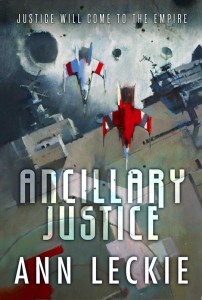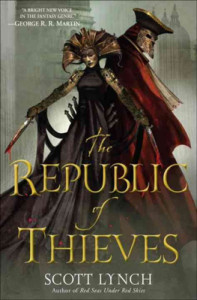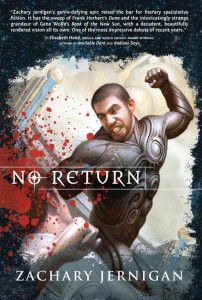Publisher: Hodder & Stoughton -
Pages: 353 -
Buy: Book/eBook
Lavie Tidhar’s The Violent Century has done for World War II what The Watchmen did for the Cold War (and should have done for the Vietnam War). I make that comparison not because both feature humans with superpowers, but because they offer an opportunity to look at real events through a hyperbolic layer. Tidhar, like Alan Moore, is interrogating real events with the speculative fiction toolkit, looking not at how it happened historically, but at what about the human condition allowed it. The result, in Violent Century’s case isn’t just a great piece of superhero fiction, but a beautiful novel of cultural and literary merit.
[The Violent Century] is the kind of stilted romance built on repressed feelings and unspoken connections.
The jacket copy of the novel reads, “Fogg and Oblivion must face up a past of terrible war and unacknowledged heroism to answer one last, impossible question: what makes a hero” I’m loathe to sum it up so simply. While there are some notions of heroism throughout the novel, the quote describes what a fan reckons a superhero novel ought to be without a sense of the novel’s real themes. In the end, The Violent Century is a love story. Not a tale of heroism or social commentary, although it is those things too, Tidhar’s novel is the kind of stilted romance built on repressed feelings and unspoken connections.
For seventy years Oblivion and Fogg have guarded the British Empire with their abilities as arms of the opaque Retirement Bureau. Divided by a secret from decades past the pair is called back to answer for their actions. Fogg is a child of neglect, exploited for his ability, and asked to do things he finds incongruent with his morality. Oblivion, meanwhile, is more of a cipher, a mystery to solve. There’s also a woman named Klara who sits at the root of the conflict between the novel’s main characters and at the root of how Tidhar’s world is changed from our own. Read More »
One Small Step: An Anthology of Discoveries by Tehani Wessely
Publisher: FableCroft Publishing -
Pages: 344 -
Buy: Book/eBook
Crafting an anthology is a bit like making a good playlist: it’s not just the selection of pieces that matters, but whether they suit the overall mood and the way they fit together. I’ve also found – though this might just be a personal preference – that anthologies with a too-specific theme tend to fall flat, the individual stories bleeding together into a single, monotone whole. Particularly if the intention is to showcase a trope-heavy subgenre, like dystopian romance, I frequently find myself losing interest: even if most of the offerings are engaging and original, seeing the same devices used and reused in such close proximity wears me out, and once I’ve reached my saturation point, I find it hard to continue. Read More »
On a rural, backwater ice planet, the individual known as Breq is searching for a weapon that shouldn’t exist when her quest yields an unexpected find: Seivarden, a former lieutenant aboard the Radchaai ship Justice of Toren, dying alone in the snow. But Seivarden ought to have been dead for centuries – and Breq should know, as she used to be Justice of Toren, a powerful AI controlling not only a warship, but thousands of once-human ancillary bodies repurposed as Radchaai soldiers. Now, confined to just one body, Breq has a single plan: to take her vengeance on Anaander Mianaai, the many-bodied leader of the Imperial Radch. But when she takes Seivarden under her wing, the decision proves to have dangerous consequences for both of them: for Seivarden is an addict, untrustworthy and desperate, and Breq is pitting herself against the most powerful person in the galaxy.
Sometimes, books sneak up on you. They’re like papery leopards lurking in the darkness, unseen and unheard, until – WHAM! Suddenly you’re pinned to the lounge beneath several hundred pages’ worth of sleek, muscular prose gloved in velvet plotting and set off by a hypnotic, staring premise. This is what happened to me with Ancillary Justice, a book I bought – rather oddly, in hindsight – after seeing it given a rare double ten out of ten by The Book Smugglers, but without having actually read the review itself, meaning that I came to it with an expectation of quality, but lacking any notion of what it was actually about. Read More »
I can remove the poison from your body.
Poison kills. Locke Lamora knows this—poison courses through his veins, eating away his health, wasting away at his mind. Poison is killing Locke Lamora, but at what cost can it be removed from his body, and can even that be considered salvation? The Republic of Thieves, the long-awaited third volume in Scott Lynch’s Gentlemen Bastards series, answers those questions, but, as any good middle-volume should, it asks so many more.
Scott Lynch emerged onto the fantasy scene as an intense, bright-burning star. Almost overnight, he became one of the most exciting young novelists when he released his debut novel, The Lies of Locke Lamora, which engaged readers with its wit, intricate plotting, mile-a-minute dialogue and characters you knew immediately upon meeting them. It was one of the most impressive debut novels of the twenty first-century. And, as luck would have it, the sequel was just around the corner. Lynch promised a book-a-year, and delivered Red Seas Under Red Skies on that schedule. The Republic of Thieves was next on the list. That was six years ago. Read More »
Publisher: Night Shade Books -
Pages: 320 -
Buy: Book/eBook
Books like Zachary Jernigan’s No Return are the primary reason why the Night Shade Books collapse was a crying shame. It is bold, edgy, daring, and uneven in spots, making it both exactly the kind of book that demands to be published and one that is likely to be passed over by larger houses. In all, No Return is a quirky mash-up of speculative genres drawn into a thoroughly compelling package before petering out in the last twenty pages. While that might sound damning with faint praise, I insist that it’s a book that should be read.
Despite exceptional writing and a mind blowingly original concept, the novel ends abruptly with little resolution.
The reality is Jernigan had no shortage of capable hands guiding him as he wrote No Return. Written mostly, if not in full, during his time in the Stonecoast MFA program, his advisers were Elizabeth Hand and David Anthony Durham. But, despite exceptional writing and a mind-blowingly original concept, the novel ends abruptly with little resolution (if any) of the two disparate plot lines. I say disparate because there’s a clear intent that the story lines connect, but they never do. Even as the novel winds to a close and the plot seems ready to stitch together, Jernigan abruptly snips the chain and carries the plot into the uncertain future of a second novel.

On the planet Jeroun, God (or Adrash if you prefer) is a vindictive son of a bitch watching from the heavens and occasionally hurtling metal meteors to the earth to punish his flock. Among the human population two ‘churches’ have emerged, the white and black suits, who oppose one another on the basis of whether God exists. One half of the plot leads up to a fighting tournament between these two factions, who have become accustomed to justifying the strength of their argument through strength of arms. This portion of No Return features Vedas, one of the black suits’ best bets to win the tournament. He travels across the countryside, joined by a female pit fighter, Churls, and an artificial man, Berun, who are heading to a secular companion tournament. Read More »
